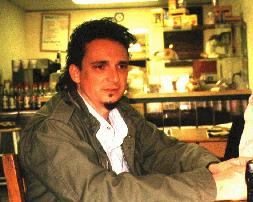
Mike Roe
Interviewed March 8, 1997 by J Robert Parks
Wheaton, Illinois
Mike Roe is the founder, lead singer, and guitar player for one of the seminal bands in Christian alternative music. The 77's, formed out of the same Sacramento church that produced Vector and Charlie Peacock, have been known for years for their spectacular live shows. They have also carved out a body of work in Christian alternative that is rivaled only by Terry Taylor's for its breadth and depth. But Mike has done more than just play with the 77's. He has done solo albums, produced other bands, and helped found the Lost Dogs, one of Christian music's finest ensembles. The Phantom Tollbooth recently caught up with Mike in Chicago. This is what he had to say.
The Island Album and the Death
of a Rock Star
Musical Influences and Passing on the Tradition
Relating to the Audience
Producing and Collaborating
What might we expect of the next 77's album --The
Future
The Struggles of Being an Artist
The Struggles of Being a Christian Artist
The Island Album and the Death of a Rock
J Robert -Let's go back in time to early '87, right about the time the Island album was coming out. I was in New England at the time, the wasteland as far as Christian music goes, but we kept hearing about this band that put on the greatest live show of all time. There were two different people who came back from California right about the time the Island album came out and said that the 77's were going to be the next U2.
Mike -Whew!
J Robert -I remember thinking that must be a lot of pressure on a band. What was that like, with all of the hopes and possibilities?
Mike -Well, certainly we were hoping to reach a wider audience and gain a whole new fan base on top of the marginal one that we had at the time. We were hoping to get on some good tours, maybe get some publicity. We did get a lot of publicity. Interview magazine was one, Rolling Stone did a nice review. When the record came out, it started getting radio adds right out of the box on some good stations. We got about fifty adds the first week, and I think College Media Journal and Billboard both reviewed it well. So we thought, "well, now we're off and running." But we were nervous about the U2 connection because they were about to release this huge record, and Island told us, "You'll ride their coattails. When we go into the shops with their album, yours will be right behind," and all this sort of thing. Unfortunately, just the opposite was the case. The second [The Joshua Tree] came out and U2 started their tour, the entire Island staff vacated their offices to go on the road and be hangers-on with U2. Needless to say, our twelve-point whistle-stop tour that we had worked out for radio promotion just came to a screeching halt. The record just sort of disappeared after about two weeks. So of course we were devastated and demoralized, and decided after that to just get out of the contract. It wasn't a good contract to begin with because it wasn't our contract; it was just a distribution deal, with some access to parts of their machinery. So we aborted it.
We had about a year-and-a-half, maybe two years, left of steam after that before that group broke up, but I think it was the death knell, basically. It symbolized a real, big-time failure in our minds.
J Robert -Do you think that was a right perception?
Mike -Well, in retrospect, no. Because I look at the whole thing
differently now than I did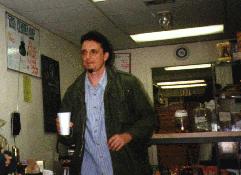 then. I was still operating on the childhood myth of show business, which
is you put out a record, you become a big star, sell lots units, and retire
to your mansion as a legend in the history of pop music. But I didn't understand
then what I understand now--it was not my calling to be a pop star. My
calling is to be an artist. I didn't know that at the time, or what that
meant. I couldn't understand how serious that was or what that would mean
to me, personally.
then. I was still operating on the childhood myth of show business, which
is you put out a record, you become a big star, sell lots units, and retire
to your mansion as a legend in the history of pop music. But I didn't understand
then what I understand now--it was not my calling to be a pop star. My
calling is to be an artist. I didn't know that at the time, or what that
meant. I couldn't understand how serious that was or what that would mean
to me, personally.
J Robert -How long did it take to make that transition?
Mike -A number of years, because I first had to let go of the old dream of teenage stardom, which was long overdue at that point, and I had to come into an understanding of the value of being an artist quite apart from the monetary gain, or fame, or whatever the perks would be of being a big-time showbiz success. Sometimes you can do both. U2 did both, and that's why everyone hates them. (Laughter). But then again, it's like hating people who win the lottery; someone's got to win it, they did, and they were worthy of it. They were very fortunate that way, but I wouldn't want to trade places with them because I'd be very bored in U2. Their artistic pallet is nowhere near big enough for me. I would become disinterested and bored.
So I had to accept that the path I was going to walk on was going to be very different, probably a lot bumpier, a lot more uncomfortable, but that only I could walk it. I had to learn how to derive joy and pleasure from it, because that's probably all I was going to get. And what I've come to find out is that as you begin to have a dialogue with your audience, or the people that are involved in your art, there's a much deeper joy to be had in an intimate relationship with the audience. And you foster that and nurture that and caress that. When I look at my own record collection, it's not filled with U2 records; it's filled with obscure, tortured artists like myself who make beautiful music that moves me. And if that's what I really value, maybe that's what I'm going to want to do.
It's kind of strange. You have to readjust all of your priorities and understand who you really are and what you're about, and that's painful sometimes. It's not always the high road. Sometimes I have to accept a position that may not be as comfortable or cushy as I hoped in order to achieve the end that I think is more worthwhile.
Musical Influences and Passing on the Tradition
J Robert -I was thinking as you talked about pop stars that you seem to have a fascination with troubled rock legends. I think of the tribute to Brian Wilson, the references to Jerry Garcia on the last album, and of course, the Elvis schtick. I'm just wondering where that comes from.
Mike -Well, Elvis is easy to be fascinated with. I think America is fascinated with Elvis. Elvis represented America, but he's too big of a topic. I don't really think much about Elvis. He reminds me of my childhood more. He was my first big influence as far as an image. I relate to him more as an image than as a star. I think what he did artistically was very significant. In the fifties, anyway, before he went to Las Vegas and became Robert Goulet. He was one of the first people to marry indigenous American music and add a exciting visual presence to it. He injected a sexual component that was not there before.
J Robert -Not in white music.
 Mike -No, that's
right. I was going to say, except in the Black community. He made Black
sexuality and sexual expression acceptable for whites. But I think that's
the least significant thing he did. I like how he married gospel, rhythm
'n blues, country, and pop music together, which is what rock 'n roll was.
And he did it and stayed original. If you listen to the records of the
fifties, almost none of them sound like Elvis records. Elvis records are
unique.
Mike -No, that's
right. I was going to say, except in the Black community. He made Black
sexuality and sexual expression acceptable for whites. But I think that's
the least significant thing he did. I like how he married gospel, rhythm
'n blues, country, and pop music together, which is what rock 'n roll was.
And he did it and stayed original. If you listen to the records of the
fifties, almost none of them sound like Elvis records. Elvis records are
unique.
When I think of Brian Wilson or Jerry Garcia, those are really big influences for me--vocally with Brian, and Garcia with guitar. Also the bands that they were in were very strange groups, even though they've come to be American icons like Elvis. They're also very quirky in that their paths were so unusual. They failed many times. They were underdogs. They'd have a big splash of success, and then get kicked down and be almost at the bottom of the barrel. And I think that's because neither of those bands always played the game commercially. They were artists first. But their audiences believed and felt the vision. And that's kind of what I've tried to cultivate--people who are loyal to whatever it is they see in me and want to follow it. We share a common vision. And I'm sharing a lot of this music with my fans who are often younger.
In a way, I feel kind of like a musicologist cum professor of American pop stylings for young people. I feel like Leonard Bernstein when he did those young people concerts. Those kids didn't know what that was about, but he did and was obviously impassioned about it. Today's average teenage music-lover may know little or nothing about what the Beach Boys did in their entire span of work. They may have heard "Surfin USA" in a movie, but they wouldn't know, for instance, about some of the really subtle, obscure works that Brian Wilson has done. Or if they're Deadheads, they may be caught up in the thrill of going to those concerts, but they don't really understand the significant melding of styles that Jerry Garcia did on his guitar and the sublime subtlety of what he and that group did musically. So these are all things that I like to emphasize. I go and find these obscure little gems and polish them, and then show them to people. They tell other people, "Look at this thing this guy found! It's beautiful!" And before you know it, that knowledge kind of spreads around and inspires people.
I'm very rarely inspired anymore by the big-time success stuff, the Madonnas and Princes. And even U2 has now become kind of representative of that whole broad-stroke commercial art. I'm more caught up in artists that may be phenomenally successful, but I'm drawn to a more obscure aspect of what they do.
J Robert -Such as?
Mike -Like Fleetwood Mac is a band that had overwhelming commercial
success, and yet the aspects of the career of that band that I'm most attracted
to are the earlier periods that are forgotten, before Stevie Nix was in
the group. Different guitar players like Peter Green and other people who've
fallen into obscurity or mythology now. There are tones on the guitar--
moods, sounds and atmospheres--that are scattered throughout those early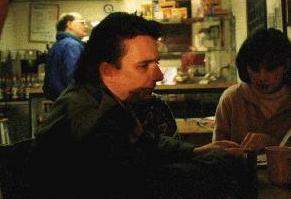 albums that are long forgotten stylistically; you don't hear them on the
radio anymore. We all listened to them when we were in high school, but
other than some hippie's record collection buried somewhere, a lot of that
is still here (gestures to head and heart) driving me. I'll introduce those
sounds into my music, and some fourteen-year-old kid who's just discovered
rock 'n roll is going to buy an album, or a friend of theirs will play
one of mine, and they'll hear that sound or that mood and go, "God, that's
beautiful. I want more of that," little knowing where I'm getting the inspiration.
So I take ideas that have been left lying around and neglected or forgotten,
and I filter them through my personality and keep it alive.
albums that are long forgotten stylistically; you don't hear them on the
radio anymore. We all listened to them when we were in high school, but
other than some hippie's record collection buried somewhere, a lot of that
is still here (gestures to head and heart) driving me. I'll introduce those
sounds into my music, and some fourteen-year-old kid who's just discovered
rock 'n roll is going to buy an album, or a friend of theirs will play
one of mine, and they'll hear that sound or that mood and go, "God, that's
beautiful. I want more of that," little knowing where I'm getting the inspiration.
So I take ideas that have been left lying around and neglected or forgotten,
and I filter them through my personality and keep it alive.
I'm becoming more and more fascinated with the artistic process where you do a lot of research and then you create some amalgam that's your own that people might think is original. I don't ever think of myself as particularly original, but I just try to find things that I like, and share.
J Robert -But you've mentioned about how often you work on a deadline, where it's not a long, measured process.
Mike -That just reflects my personality, being lazy. I'm more apt to just get up and piddle around the house and waste time--read books, talk on the phone with my friends. I'm highly motivated by a schedule and pressure. You know, if you can't be disciplined as an artist, then you use force or threats. I respond best to that.
But that unfortunately carries into the more serious aspects of my life as well. I've always been the kind of Christian that was involved with God because I didn't want to go to hell, not because I wanted to be a good person. But it works!
The Bible says, "Well, if you don't want to love Me, at least don't let Me send you to hell." I have a daughter. I'll try to entice her to eat good food by explaining how good it is and how tasty it is. Sometimes she goes for it. If she doesn't, then I say, "If you don't eat this, no dessert." And if she doesn't go for that, then the last one is absolute brute force: "I will spank you." Then she eats it. She still got it, though. And then, of course, she'll go, "Oh, this is really good, Daddy! I didn't know how good it was, Daddy!" Some people are just stubborn that way.
Relating to the Audience
J Robert -I read that you're still playing "Denomination Blues" in concert.
Mike -Yeah!
J Robert -I don't know how you'll take this, but it strikes me as a song that someone in their twenties writes and then leaves aside as they get older, but obviously you don't agree.
Mike -Well I didn't write it. That song is probably seventy or eighty
years old. We recorded it [on Ping Pong over the Abyss], played
it to death, and dropped it. But when I play solo acoustic, it's just nice
to play, especially if I feel the show's been really trivial message-wise
or too clowny. It's nice to dredge that up out of nowhere. People get really
shocked, upset, and feel all guilty and everything; it works really well.
I think it's just a classic. But I couldn't have written that song.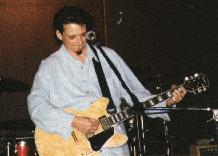
J Robert -Why?
Mike -Because it's just so basic and direct. I can't imagine writing something that simple or that confrontational. I tend to want to talk around the problem.
J Robert -You mentioned earlier about a relationship with your audience. In a lot of your songs, you almost invite your audience to put them on you and treat them as autobiographical songs. Yet you've expressed again in different interviews that you're uncomfortable with that.
Mike -Well, I'm uncomfortable with it being chapter and verse because most of them are composite pictures of things. In fact, I get really confused sometimes because sometimes I don't know who I'm singing to or about because there's more than one woman involved (if it's a relationship-type thing). That gets really scary because you start to wonder, "Who do I really love? Who was I really in love with? Who am I in love with? What does this tell me about myself as a person? Maybe I m really screwed up. Maybe I need to go check myself out." So it's very dangerous to grab any one song and say, "Oh, this was about that person or that period of time." Because one verse may be about my father, or my mother, or maybe it's about my best friend who was going through that. Maybe I didn't write the lyric, you just think I wrote it. I identify with many of our tunes that I had nothing to do with lyrically, but everyone assumes that I wrote them because they're so miserable and tortured. That's not always the case.
A lot of times, it's just being an interpreter of songs, which I'm happy to do. If I never wrote another song, it wouldn't bother me, as long as I can find great songs to sing. The interpretation is where I derive the most satisfaction.
Producing and Collaborating
J Robert -A lot of the people who are associated with the 77's--the Exit artists (Steve Griffith and Charlie Peacock) and then the Lost Dogs guys--do a lot more producing now, even more than recording anymore. And yet you're out there playing a lot and making albums, sometimes more than one a year. Is that related to that desire to be interpreting songs?
Mike -Well, it's related to not having to be forced to do producing in order to eat. Those people made choices, lifestyle choices. Also, I don't think that they were--and this is not to denigrate them as artists --but I don't feel that they were as intimately involved with or as respectful of their audiences as I've been, and I don't mean that disrespectfully.
I used to get on Griffith all the time because he would constantly rearrange his tunes. He'd make an album and then go play a concert, and it'd already be re-written to where it was unrecognizable from the album he recorded. And I'd say, "You're not allowing your audience to get inside of the work you did. You're already changing it, which indicates you're uncertain about the work.
And Peacock was the same way. He always had to hire some big-time producer. He was his best producer. I've heard his demos, and they're brilliant. They have so much magic and heart-felt intimacy. But some Nashville or New York guy would come along and tell him, "Here's how your music should sound, Charlie," and run it through a bunch of crappy synthesizers that are going to be out-of-date next year, giving it the "now" sound, you know. And Charlie would talk himself into liking it, and then a year later the record's worthless to him and everybody because it wasn't his true vision.
Audiences smell that. Audiences know when you're willing to stand behind your work and when you've got your gut in it to the level that you're going interpret it, or play it out for a number of years. Not that someone can't rearrange their tunes; it's more a question of being committed to your vision from beginning to end.
I used to get in fights with Griffith. He's mixed a lot of our records, and we would fight during the mixing based on the fact that I had a vision, and he couldn't stand that. It bothered him.
J Robert -Why?
Mike -I was so committed to seeing my work through from my initial
interpretation to the 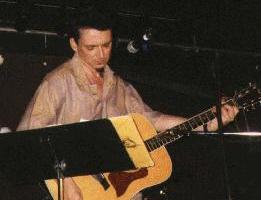 end.
But he wanted to play with it, and I said, "No, I want that voice to sound
like this, I want that guitar over here, this to sound like that. I have
the picture, don't mess with me on it. Trust me." We'd be just like brothers,
fighting cat and dog over this. And I said, "Why are you fighting my vision?
Why are you doubting the artist who is? If I didn't have any ideas, then
I would ask you. If I felt like I didn't know what to do with this, I'd
be more than happy for you to interpret it for me, and we'd have a great
collaborative experience."
end.
But he wanted to play with it, and I said, "No, I want that voice to sound
like this, I want that guitar over here, this to sound like that. I have
the picture, don't mess with me on it. Trust me." We'd be just like brothers,
fighting cat and dog over this. And I said, "Why are you fighting my vision?
Why are you doubting the artist who is? If I didn't have any ideas, then
I would ask you. If I felt like I didn't know what to do with this, I'd
be more than happy for you to interpret it for me, and we'd have a great
collaborative experience."
I think it 's just a different way of working. I want to qualify all of this, because these guys are some of my best friends, and I don't want to call into question what they've done. I just want to say that different people work different ways. Some people have a vision that is more to do with what's current and what will sell. Or maybe it's to do with a certain style that they want to jump on, or a certain kind of . . .
J Robert -Or just something new that they're excited about.
Mike -Yeah, exactly, whereas I was always much more of a very conservative artist, very much into the retro thinking of doing period pieces, wanting to capture a certain . . . It'd be like someone who is really into Picasso and was going to interpret his cubist period, and all their paintings looked like that. Well, it may be unoriginal, but it is a vision. If you're obsessed with that, there's probably a reason; and these are things I wanted to do. I got very specific about what I wanted to do. I've kind of let go of that in recent years. I tend to work more collaboratively.
J Robert -Like in the Lost Dogs?
Mike -Not just there, but in the solo work even. The Boat Ashore is a good example of letting go. Not letting go, but rather working collaboratively with someone, of being as open to his idea and his vision as he is to mine. If you get the right kind of chemistry, sometimes it's really magical. It's always incredibly difficult, but I think it's worth it.
I enjoy collaboration a lot. And for that matter, I would love to work with Charlie Peacock and Steve Griffith again. I'm always saying, "When do I get to work with Charlie or Steve again?" These are all great artists. It's just we all work differently. But I think audiences will follow you further if they're convinced you're as sold on your music as they are, that you're not willing to just back hand it, or betray it simply to do something new. In many ways, this has held me back, too; I feel like I've been too conservative. I'd like to be a lot more adventurous now than I used to be. I've kind of had it with interpreting all my favorite records.
What might we expect of the next 77's album --The Future
J Robert -What might we expect of the next 77's album, the next Mike Roe album?
Mike -I have no idea. (pause) I don't think there's going to be one of each for a while. I'm going to do an album with Derri Daugherty, from the Choir. We're going to do kind of a duo thing. I'm sure he'll be bringing in very contemporary influences, and I'll be bringing in real retro ones, and some contemporary ones as well. Hopefully we'll come up with something. I think our voices will blend well.
J Robert -Does this mean that the Lost Dogs are finished?
Mike -I don't know. That's up to Gene(Eugene). It's Gene's band.
J Robert -Really! I didn't know that.
Mike -But we've wrested it from his control. He's run it into the ground, and [what] we've decided to do is take it over from him. I don't know what the future of the Lost Dogs is. I know that we have an album that's half done.
[March 8, 1997 Interview with Mike Roe continued after soundcheck.]
J Robert -We did a lot of the older stuff in the first half of the interview, so I thought it might be a good place just to ask what is the current status of the 77's?
Mike -Screwed up. I don't know; our drummer's in another band right now. They're trying to get a record deal, they've already got a publishing deal. We are talking about making another record, but we haven't written it yet.
We went to Stockholm last summer. We were there for about a week to ten days and wrote the outline of an entire album with a whole new sound. But that material has lied dormant since then. We worked on it a little bit, and then a bunch of things happened: everyone was sick or busy, or in the process of trying to make a living, or just inertia.
J Robert -You said that the stuff you did last summer was a whole new sound. How so?
Mike -Well, it's more vibey, more acoustic, more kind of a trippy psychedelic-acoustic thing. I don't know. It's hard to describe. It doesn't sound like the last album, and it doesn't sound like The Boat Ashore. I don't know what to compare it to. We're trying to push into a new realm, I think.
J Robert -You've been away from it for a while. Would you likely
pick it up from there, or have you moved on from that?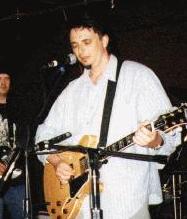
Mike -From what?
J Robert -From what you did last summer.
Mike -No! That tape was so inspirational to us. It's just a cruddy cassette, you know, but it had so many really potent ideas that we've all kind of held it in our minds as something we want to pursue. All we have to do is go back and find it, and then work on it.
J Robert -What can we expect at your Cornerstone show?
Mike -Well, they want the "Mike Roe Band," whatever that is. So we'll probably add a guitarist or maybe another keyboardist, and do The Boat Ashore and Safe As Milk and things like that.
J Robert -Should we expect then that there'll be some old 77's tunes, or should people not come expecting that?
Mike -They should not come expecting that. I mean, maybe one or two, but it's mainly going to focus on that other sound.
The Struggles of Being an Artist
J Robert -This is a more philosophical question, a more pompous question, maybe.
Mike -(laughs) That was my word.
J Robert -We talked about how you look at things differently now than you did, say back in the mid-late eighties.
Mike -Yeah.
J Robert -But what sort of struggles do you as an artist face now, and how are those similar to maybe what other artists who are also Christians facing, and how are they different?
Mike -Well, the Christian part is a whole other dimension from just the artist part. As an artist, any artist struggles to make a living. You've got to put food on the table, and you've got to provide for your children. Unfortunately, most artists do not have the luxury, and I'm included in this, of sitting around just doing art. Most of the time, I'm consumed with trying to make my monthly expenses which means I've got to go out and do things like just singing for my supper, like tonight. Or I have to go and play in undesirable conditions, or for not even enough money to cover the rent. Maybe sometimes you have a good month, and it's really good, but typically musicians will just spend what they have and not save. Then you're starving again the next month. A lot of it, again, is due to lack of discipline or well-ordered living.
If an artist is not subsidized by some kind of sponsor or organization, then you have to make sure that you're covering yourself. So your first priority every month is, "Did I make enough money to live, to survive?" And until that's done, that consumes most of my thinking. It's hard to get into a space to write.
Usually a writing space is one that's unencumbered by those concerns. For me, I like to go out into nature. I go to the beach or mountains or some small town where I'm able to just sit and really get into the music. That's why that Stockholm tape was so productive because we were in a foreign country and didn't have any responsibilities other than a couple of gigs. Every day we'd get up at our leisure and start sitting around the kitchen table just beating out rhythms and banging on a guitar. After several days of this, it becomes a lifestyle and the ideas start really flowing.
Whereas my work-a-day regimen consists of phone calls to my agent,
lining up 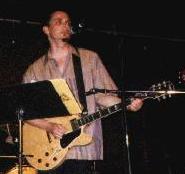 [commercial]
jingles to play on, lining up production jobs, or trying to put together
some record deal that will give me a month's rent. All of that takes a
lot of energy, a lot of time, and doesn't leave much room for getting into
that space of being receptive to ideas. I'm looking for a way to develop
the kind of discipline where I can come up with a writing regimen in spite
of that energy suck of making a living.
[commercial]
jingles to play on, lining up production jobs, or trying to put together
some record deal that will give me a month's rent. All of that takes a
lot of energy, a lot of time, and doesn't leave much room for getting into
that space of being receptive to ideas. I'm looking for a way to develop
the kind of discipline where I can come up with a writing regimen in spite
of that energy suck of making a living.
Then as a Christian artist (whew), most the pressures of that come from the limitation of the so-called industry in that there are only so many opportunities for you, depending upon how user-friendly you are to churches and to the whole Christian "scene." I don't find myself particularly user-friendly at this point, except to my hard-core fans. I'm working towards becoming more adaptable to the scene, where I may end up playing more churches.
The Struggles of Being a Christian Artist
J Robert -How would you do that and yet still stay true to who you are?
Mike -That's a good question, only I should be asking it. I don't know. I think it's a matter of trust. It's getting people to trust that you're a good guy when you come there, that you're going to provide whatever it is they're hiring you for. That could range anywhere from hardcore evangelism to just a night of entertainment and fun without any swearing or dirty words or drug use on the premises. There's all kinds of reasons why churches hire entertainers and singers.
You know, a lot of times people in churches are so up tight with their program and their, not their doctrine, but their way of expressing it.
J Robert -Yeah, and just their understanding of social norms.
Mike -Yes. It tends to get really strange. You walk into situations where you have a group of people that have all talked the same language for five or six years. They're very inbred and cloistered. They're used to relating to each other, and you come in and they look at you as an outsider. You have to gain their trust and respect and learn how to communicate with them without giving into their trip any more than you . . . I'm not necessarily trying to get them to give into mine, either, because I don't want to have a trip. I just want to be real and not make people feel uncomfortable, or feel that I'm imposing some kind of agenda upon them.
So it's a challenge, especially because a lot of them would be shocked if they knew the real reason I was there, ninety percent of which is to survive and make a living. I take the art part for granted, and as far as the ministry part goes, that's God's job. I count it a privilege that He would ever use any art or noise that I make to do some kind of eternal, spiritual work. But neither do I want to go in there and insist that that happen, or assume that it will happen. I can certainly pray that it happens, but I can't make it happen.
Last night, I played at a church where they wanted to have a prayer circle, so we all went through our individual prayer. Then one of the elders, or whoever he was, spoke out and said, "Lord, I just sense for Mike there's just this emptiness." And I'm sure that he was thinking of it in terms of a negative thing--some kind of negative vibe I was giving off, which was probably half true. Then I thought about it later and thought, "But isn't being empty what we're supposed to be?" I didn't come in there all full; I want to be almost invisible because that's where God works best. Rather than me walking in with my whole spiritual agenda, I just want to get up there and be who I am and let the music speak for itself.
I grew up in an environment where I saw a different evangelist every week. I could count on one hand the ones that had any feeling towards me that I felt was genuine. Maybe they all were genuine, but I couldn't get past all the affectation and the studied mannerisms that were just part-and-parcel of their communication. It felt very strange and creepy to me and had very little to do with the next day at school, or my friends, or the records I listened to. It's like, there was all that world, and then there was this strange, evangelical world at church on Sunday night where people got the heebie jeebies and kind of shook, and did all these whirling dervish gymnastics around the church.
I'm more inclined now to go to an Anglican/Catholic, high order, formal church that is really boring and really ritualistic simply because I may like the music or the feeling I get. I can be anonymous rather than return to the kind of churches I grew up in. But there's good things in all of them. It's not the church. It's the Word of God, and it's the Spirit of God. And that blows like the wind. If God can talk through a donkey, he's not limited to the church that you go to, or the weirdness within it, thank God.
And that's part of what I do. He's not limited by my weaknesses, either. I'm grateful that I can stand in any gap anywhere and do this.